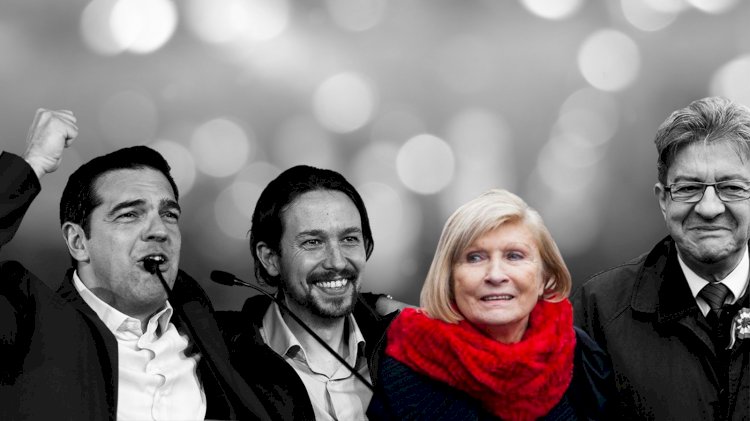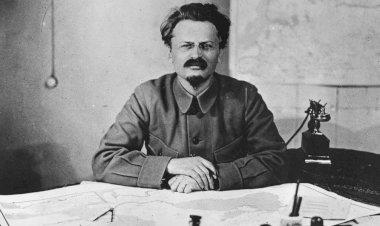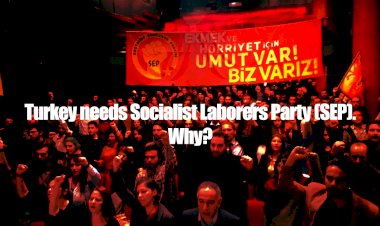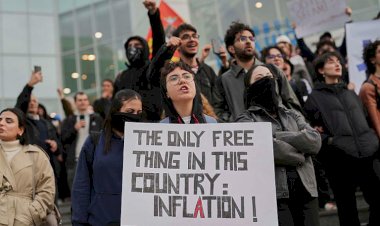Left Populism and Mouffe- Güneş Gümüş

Chantal Mouffe, one of the owners of the “radical democracy” thesis, which inspired a number of parties such as HDP and Podemos worldwide, is now suggesting another political initiative: "Left populism." While these parties still adopt “radical democracy” as a guide, Mouffe has already declared that the way out for the left is in left populism, which is radical reformism.
In Turkey where a revolutionary leftist tradition is strong, Mouffe's thesis of radical democracy was presented as if it is completely new model not liberal democracy. However, Laclau and Mouffe stated that they were loyal to liberal democracy in their book, Hegemony and Socialist Strategy, in which they put forward the thesis of radical democracy: "The left's task is not to reject liberal-democratic ideology, but rather to deepen and expand it in the direction of a radical and pluralist democracy." (Laclau and Mouffe, 2015: 270). Because of the fact that the left in Turkey is in the habit of accepting without questioning and reading, the label of "radical democracy" still continue to be thought as an alternative to bourgeois democracy.
Nowadays, there are other examples of changing the cover of reformist theses and presenting it like something new in the intellectual circles. For example, some left intellectuals, who took Kautsky out of the dusty pages of history and adopted him as a guide so that they would defend the relations of the Democratic Socialists with the Democratic Party in the USA. A few years ago, these Neo-Kautskyists declared Marxists stuck in the past! Mouffe is no different. By saying that Marxism has reached its “post stage” is nothing but putting post-modern sauce on 100 years old social democratic thesis that is not a completely different product. Nevertheless, we prefer theorists who have great concerns about the world, rather than postmodernists who have completely lost their hope of change. But the left and other elements of social opposition in Turkey follow ideological debates and currents in the West with a 10 to 20 delay, There is no question that Mouffe's argument that the “left populism” debate and the social rather than identities should not come to the fore.
2018 Model Postmodernism
Postmodernism emerged as the theoretical product of the disappointed intellectuals of 1960s and 70s who lost hope of revolution. The 1980s was the beginning of a period in which the working-class movement was defeated by capital under neoliberal attack, identity-centered mass movement called new social movements retreated, and capitalism declared its victory of in the face of socialism with the collapse of the Eastern Bloc towards the end of the 1990s. It was not surprising that the bleakness of the conjuncture surrounded the intellectual world. Since the proletariat's area of influence as a political subject has narrowed, identities have come to the fore, and mass actions have also been left behind, the attempt to define a movement that has been reduced to small gains around identity politics.
Since the late 1990s, this air partially dispersed. The promises of capitalism also ended. Although the world left the Cold War era behind, it did not experience any other than imperialist conflicts, wars, an order based on ignoring liberty and equality. Especially after the 2008 crisis, inquiries about capitalism, its neoliberal age and, of course, postmodernism have peaked. Movements that use the word socialist are very popular in the USA, at the epicenter of anti-communism. The ground upon which the postmodernists would step on was shaken.
Mouffe must have felt the need to adapt herself to the requirements of the new era. However, although it seems like the surface of her theory changes, the emphasis on the base is still the same that is a composition of not seeing the working class as the main subject of social change, a plurality whose way of constitution is uncertain, and a “radicalism” that does not exceed the boundaries of bourgeois democracy...
"In neoliberal capitalism new forms of subordination have emerged outside the productive process. They have given rise to demands that no longer correspond to social sectors defined in sociological terms and by their location in the social structure. Such claims – the defense of the environment, struggles against sexism, racism and other forms of domination – have become increasingly central. This is why today the political frontier needs to be constructed in a ‘populist’ transversal mode." (Mouffe, p. 11)
“there is no reason to assume that the working class has an a priori privileged role in the anti-capitalist struggle. Indeed, there are no a priori privileged places in the anti-capitalist struggle." (Mouffe, p. 29)
Let's not be unfair. Mouffe implicitly states that the emphasis in the radical democracy thesis has is not relevant today:
"When Ernesto Laclau and I wrote Hegemony and Socialist Strategy, the challenge for left-wing politics was to recognize the demands of the ‘new movements’ and the need to articulate them alongside more traditional workers’ demands. Nowadays the recognition and legitimacy of these demands have significantly progressed and many of them have been integrated into the left agenda. In fact it could be argued that the situation today is the opposite of the one we criticized thirty years ago, and that it is ‘working-class’ demands that are now neglected."(Mouffe, p. 33)
Whether Mouffe learned by experiencing how much the endless division of identity politics narrows the arena of the left, "the creation of a collective will through a chain of equivalence demands the designation of an adversary." (Mouffe, p.35)” instead, emphasizing that “social problem” should come to the fore rather than identities. (Mouffe, 2019: 73) is calling:
"The challenge for a left populist strategy consists in reasserting the importance of the ‘social question’, taking account of the increasing fragmentation and diversity of the ‘workers’ but also of the specificity of the various democratic demands. This requires the construction of ‘a people’ around a project, which addresses the diverse forms of subordination around issues concerning exploitation, domination or discrimination. "
Time is on the Side of Populism
Mouffe describes the current dynamics as "a populist moment." She (Mouffe, p.12) describes populism as “a discursive strategy of constructing a political frontier dividing society into two camps and calling for the mobilization of the ‘underdog against ‘those in power’." with reference to Ernesto Laclau's book “On Populist Reason”, with whom she developed her thesis "Radical Democracy."
By saying that the neoliberal paradigm, which has been dominant since 1980, has entered the moment of populism in Western Europe due to the hegemony crisis, Mouffe argues that left populism will be the antidote against the rapid emerging right populism. Mouffe authored her book on the polemic that why a left populism is needed. In her book, she disscussed the actors and the content of left popülist Project but her intervention is not a political but an academic one. Although Mouffe predominantly puts Podemos and Melenchon on her agenda, Corbyn in Britain, Sanders in the USA and Syriza in Greece are the other contemporary examples of left populism.
Mouffe is right about the crisis of neoliberal hegemony, which became clear especially after the 2008 crisis, and this situation strengthened both political trends by weakening the central parties. When the debt crisis in Greece led the economy to collapse, the votes of the central right and left parties (PASOK and New Democracy), which had marked the country's politics for decades, were crawling on the ground. The bill is even heavier for social democracy, which does not differ from the center-right. Until Corbyn got the ropes in England, the Labour Party had become an actor paralyzed by its internal conflicts and lost its social support. In Germany, where social democracy was born, the SPD had dropped to the lowest vote level it had received since 1949 in the 2017 elections. And many other similar examples in many countries can be given ... It is not a new situation for the masses to turn their backs to the central parties, which favor the continuation of everything as it is, when the economic or political crisis shakes the society. When life is in extraordinary and people are concerned about their life and the future, there is nothing more natural than those who say “the same old same old” loses their social ground. Extraordinary conditions give birth to raise of extraordinary political alternatives that make political extremes strong. If the radical-left is not a strong and influential actor, the political areana is filled by the far right (which Mouffe describes as right-populism) which organizes despair over anger and hatred. In times of crisis, the basic discourse of both the far right and the far left is on the economy. The reality behind the demagogy of “people vs political elites” is to put the burden of the crisis on the shoulders of the working class majority. There is no better time for the radical left than times of crisis to expose the state of the exploiters, the capital and the political elites in its service, and to find a massive support.
What will Be the Basis of Left Populism?
Mouffe demands that the jargon of left populism be based on articulating various popular democratic demands, on the basis of hostility between the political elites (oligarchy)[1]:
Populism draws a political boundary on the distinction high ranks and lower level. Like the public against the institutional order. Therefore, in this conjuncture, the far-left parties in Marxist tradition that try to draw the boundary between the proletariat against the bourgeoisie and the labor against capital do not have any chance of success. Instead, a border in the form of “people” can be drawn against neoliberal institutions. In this case, how will you establish the people? What are the grassroots? Those against oligarchy, against neoliberalism are grassroots.(Mouffe, 2019: 110).
The basis of neoliberal hegemony, according to Mouffe was made (2019: 23-4) “by a set of political-economic practices aimed at imposing the rule of the market – deregulation, privatization, fiscal austerity – and limiting the role of the state to the protection of private property rights, free markets and free trade." After declaring that neoliberalism was originally based on an anti-working class policy, Mouffe (2019: 14) argues that the identity of left populism, which expresses "a ‘chain of equivalences’ articulating the demands of the working class", must act through the composition of demands. From the point of Mouffe’s view, laborers are an identity among various identities; It does not go much beyond being a simple part of the "equivalence chain".
One of the main indispensable claims of postmodern theorists is to blame the socialist/communist thesis put the working class at the center with an "essentialist" approach and reject the working class as the subject of the revolution because there is no such thing as subject for postmodernists. Although Mouffe shifted from the "radical democracy" thesis to "left populism", there is no change in ignoring the working class as a subject[2]. There are some objective reasons behind the influence of the left.
The neoliberal period, which started in England and the USA since the late 1970s, progressed with the disintegration of production processes and increasing the weight of the service sector in the developed countries of the West as the Far East turned into a production center. The Fordist model, which was dominant model for many years, brought together a large number of workers in large enterprises, paving the way for organizations and thus mass actions. The division of these factories into small workplaces, the fragmentation of the employees within the same workplace, the expansion of the service sector, and the enlargement of the workplaces where few workers work, have hit the organizational abilities and the power of the unions hard. After 1980, worldwide unionization rates dropped dramatically. This situation brought about the weakening of the working class as a force of action. As the working class's capacity to determine politics weakened, its appearance in front of the public was interrupted as an effective social actor. In such a conjuncture, it was much easier for postmodernists to declare the death of the working class and to make others accept this claim.
Although the power of the working class has weakened as a collective subject, its size has enlarged greatly since the 1980s. Even those who proclaim that the working class is overdue have to admit that a much larger part of the society became ordinary workers. In return for the wage, the work became widespread without any determination in the production process. The process of proletarianization, which Marx and Engels (2014: 28) envisaged in the Communist Manifesto, took place: “It has converted the physician, the lawyer, the priest, the poet, the man of science, into its paid wage labourers.” Respected professionals turned into paid wage labourers. Since the quantitative growth of the working class is not to be ignored, the postmodernist school stands with an alternative concept to Marx: “precariat”. Precariat formed by combining the word "precarious" and "proletariat", does not mean anything other than expressing unsecured parts of the working class. However, postmodernists enjoys their “inventions” and “alternatives” against Marx.
The tendency of the postmodernists to ignore the working class, who had no claim to change the society, has transformed the whole left to the extent that they established intellectual hegemony. When almost all of the left, including the radical wing, turned took the path of identity politics, the left activity basicly focused on the oppressed identities, that is, limited social groups. The left, who had lost the chance to be inclusive and influence an entire society, quickly lost power and became ineffective. Now Mouffe confronts us with the emphasis that social movements can only succeed by uniting in a political party that highlights the social problems. But she still resists to put working class openly at the center of this policy. However, left populism has no chance to become a strong political actor without being working class oriented.
Working class refers to the majority of society and it is a social group of objective interests. Mouffe is talking about populism but she does not give any priority to the demands political problems in her discourse. The most basic way to construct such a political way is to follow a labour oriented agenda such as long working hours, low minimum wage, annual leave, retirement age, pension, etc., which are the focus of neoliberal attacks. A labor-oriented discourse on these issues will quickly get the support of large sectors of people. For example, Corbyn or Melenchon ... Corbyn's rapid success in gaining social support, was due to the campaign built on the demands such as free education, taxation of the rich, and expropriation. All of these demands aimed at improving the living conditions of the people. Likewise, the demands of the laborer agenda such as taxing the rich, reducing the retirement age to 60, 35 hours of weekly work, increasing the paid leave to 6 weeks were the determinants of the popularization of Melenchon. Neither Corbyn nor Melenchon got their popularity by chance or coincidence. The working classes, which make up the majority of the society, are especially tired of backing the burden of the 2008 crisis. Discourses that will extend the rights of labor – with a convincing manner - are quickly gaining support in the first place.[3]
Agonism Instead of Antagonism
Mouffe complains about neoliberalism saying: "the need for a political frontier between ‘we’ and ‘they’ was deemed to belong to an obsolete model of politics and the ‘consensus at the center’ was celebrated as a step towards a mature form of democracy in which antagonism had been overcome." (Mouffe, p. 22) Mouffe, who thinks that excessive emphasis on the consensus harms democracy, defines the basics of this hostility relationship in Left Populism by saying that democratic politics cannot be without hostile forces. Mouffe, who opposes erasing the division between central right and left under the name of consensus and ignoring the conflicts in the neoliberal period, sees the conflict as the indispensable character of democratic politics. However, this conflict should not mean an struggle between enemies, but a struggle between opponents, for Mouffe. Mouffe highlights the concept of agonism (the relationship between adversaries) with this perspective:
“The issue that matters in a liberal democratic regime is how to establish the politically constitutive us-them distinction in line with the recognition of pluralism. The important thing is that the conflict takes the form of "agonism" (the struggle between adversaries), not an "antagonism" (antagonistic struggle). The agonistic confrontation is different from the antagonist confrontation ... It is not because it is an enemy that needs to be eliminated, but because it takes into account its existence as a legitimate adversary” (Mouffe, 2019: 101)
Thus, Marx's working class - bourgeoisie antagonism (friend-enemy relationship) is replaced by the opposition that accompanies consensus. According to Mouffe, “the need for a political frontier between ‘we’ and ‘they’ was deemed to belong to an obsolete model of politics and the ‘consensus at the centre’ was celebrated as a step towards a mature form of democracy in which antagonism had been overcome." will provide agonism. It means that if one of the founding elements of democratic politics operates on the basis of pluralism and competition, a world system based on differences is possible.
Mouffe says that it is possible to reach consensus without excluding anyone. Really? Do the capitalists tolerate the working class as "adversaries / rivals" as the political subjects of the oppressed and exploited? While things are going well, maybe to a certain extent... But what if the crisis raises a question of existence? The world finds itself in such crises much more often.
For example, would there be a competitive consensus in the USA if millions took the streets in 2008 against saving financial institutions with the money of people? Or was it supposed to suppress the movement by force? Mouffe herself reveals this from the Chavez example that the ruling classes are not accommodating at all when they feel their interests in danger: “Seeing the other side as an opponent, not an enemy, and acting like that. It is not enough for you to act like this for this to happen. On the other side, they should play the game like this. This never happened in Venezuela. Chavez was declared an enemy as soon as he came to power ”(Mouffe, 2019: 114-5).
Mouffe originally tells us, "Even though there are various differences between us, we are all on the same ship." This is support from left to the capitalist system ,which is struggling with crisis and suffering from a loss of legitimacy, and the governments under the service of it. There is more: "what we were advocating was a ‘radicalization’ of the ethico-political principles of liberal-democratic regime, ‘liberty and equality for all’." (Mouffe, p.25) says for the theses on radical democracy. As if the liberal democratic regime base on ethical-political principle of equality, freedom for all. As if this was possible under capitalism. Gramsci was talking about people like Mouffe, who was the maintainer of the regime's hegemony in civil society, who was the safety valve of the system, while he was saying things were more difficult in the West.
We saw the police brutality against the Yellow Vests movement in France (similar to the violence of AKP government to suppress Gezi uprising) the favorite country of the EU, which claims to be the center of advanced democracy. The power of the Nazis in Germany, Mussolini in Italy, and Franco in Spain is not just on the dusty pages of history. These regimes are the most crystallized examples of what the capacity of ruling classes can do when they are desperate against a deep economic-social crisis that results in the revolutionary breakthrough of the working class. There is an irreconcilable conflict of interest between the working class and the capitalists and this is where the hostility stems from. Because the capitalists have the opportunity to exist as long as they can draw surplus value from the working classes that are the source of exploitation. When you say “consensus”, you say to the working class to sacrifice their interests because the ruling classes have a huge state mechanism behind them to prevent capitalists from compromising. Consensus is not even a dream when considered internationally. Is it possible to think about the reconciliation of the working people, whose houses have been destroyed in Iraq and Syria, and whose workers have been displaced from their homes, in Iraq, with the US ruling classes muffled to the top of the world? The world is under the shadow of these imperialist conflicts today.
How to Build the “People”?
According to Mouffe, in order to generate collective identities, which are the founding element of politics, left populism "must unite a series of democratic demands and create a common will." (Mouufe, 2019: 112). What will be the cement that will combine the plurality Mouffe described? For example, Marxism defines an objective basis while talking about the revolutionary unity of the working class, with an emphasis on common interests. Look at Chile, Lebanon, Iraq; how neoliberal attacks and poverty united all the workers of these countries!
Mouffe is not in the process of describing an objective ground that will bring the plurality together. The result is a “common will” that is claimed to be created on moral, conscientious grounds:” "Conceived as providing the common identification of persons involved in diverse democratic struggles, a radical democratic conception of citizenship could constitute the locus of construction of a ‘people’ through a chain of equivalence." (Mouffe, p.36) If the people had acted with a democratic consciousness automatically, we would not be at this point, and probably Mouffe should have asked herself that she gave the task of raising awareness of those who did not bear this consciousness to the left populists:
“The criterion of choosing between different policy options is the question of which radicalizes democracy. In my opinion, we are not acting as radical democratic citizens in life. Of course, there are as many people in the world who are not interested in acting as citizens. The important thing is to develop and strengthen this awareness. The left populist strategy aims to develop this awareness.” (Mouffe, 2019: 126)
“To develop awareness”; How? This point gets interesting. From the despair, to the help of this great project, the affectivity that will build the people and artistic and cultural practices as creators of these sensations are called:
“"Recognizing the crucial role played by affects in politics and how they can be mobilized is decisive for designing a successful left populist strategy." (Mouffe, p.40)
"Artistic and cultural practices have for that reason an important role to play in a left popülist strategy. To maintain its hegemony, the neoliberal system needs to constantly mobilize people’s desires and shape their identities. The construction of a ‘people’ apt to build a different hegemony requires cultivating a multiplicity of discursive/affective practices that would erode the common affects that sustain the neoliberal hegemony and create the conditions for a radicalization of democracy." (Mouffe, p.40)
Apart from the construction of a people acting on the radicalization of democracy, Mouffe is making an extension to link the left populist party to the heterogeneous democratic demands with its equivalence chain: “... there is a need for an icon that will allow a series of heterogeneous demands to come together, but will not impose a single language. Struggles must continue to maintain their own characteristics ... A common will must be formed for specific goals and objectives. For this, an icon representing unity, a principle is needed. This symbol can be a leader, a struggle ”(Mouffe, 2019: 116). As we said, Mouffe went too far compared to postmodernists; when you have concerns about shaping politics, it does not happen otherwise. Let's check out the argument. There is no magic wand in the hands of a very successful charismatic leader. The person you call a leader stands out with a discourse, political stance and demands. It is same with the struggles.
Decomposition of the Economic and Political and Patriotism
Mouffe (2019: 57) formulates her perspective as follows after emphasizing "a false dilemma like revolution or reform": "... eroding capitalism ... I love this idea. It is not a frontal conflict, but struggles that will weaken the system, create cracks in it, wear and erode. This means making non-reformist reforms.” (Mouffe, 2019: 130) Didn't the reformist/social democratic movement show the last century of who eroded whom? When you anticipate a solution within the boundaries of the system, it may not take much time to find yourself at a point moving with its values.
While Mouffe says that the state is not a neutral field, but an areana of hegemony struggle, she wants to state that left populism can come to power and change the functioning of the system. Mouffe, who thinks that it is necessary to “act from existing institutions” (Mouffe, 2019: 127), develops an attitude that is in line with the nature of reformism in an attempt to separate the economic and political sphere of the capitalist order:
"False dilemma proceeds from the widespread confusion between the political institutions of liberal democracy and the capitalist mode of production. While it is true that such an articulation is the one that we have so far encountered historically, it is a contingent one… t is unfortunate that Marxism has contributed to this confusion by presenting liberal democracy as the superstructure of capitalism. It is regrettable that this economistic approach is still accepted in several sectors of the left that call for the destruction of the liberal state. It is within the framework of the constitutive principles of the liberal state – the division of power, universal suffrage, multi-party systems and civil rights – that it will be possible to advance the full range of present-day democratic demands… This does not mean accepting the capitalist order as the only possible one and, although it remains within the liberal-democratic political framework, the politics of radical reformism that I advocate is not thereby prevented in challenging the capitalist relations of production." (Mouffe, p.29)
The main difference of capitalism from its previous forms of production is the separation between the political and economic spheres from which exploitation originates. That is, the former ruling classes have become exploiters based on their political-legal privileges: the necessity of being a citizen to have a slave, the feudal lord's exploitation of the peasant's labor with the right to seigniorage. But under capitalism, the source of exploitation is an economic imperative, not a legal one. Workers accept the exploitation, as it is not possible to survive without working in a society where everything turns into commodities. Although the source of exploitation was not the legal-political system, it was possible to differentiate between the economic order and political functioning, and each area could be privatized within itself. But this does not eliminate the deep bond between them, it just conceals it. It is as if there is no common interest, fate and solidarity between the richest people of the society and those sitting at the top of the state. This situation consists of only one phenomenon. In this context, although a left populist party can make partial changes when it comes to power - the ground of these reforms has disappeared in the neoliberal era - it is not possible to transform the original essence of the system that produces inequality and tries to narrow the liberties at all times. Mouffe says that by remaining true to the liberal democrat model, one can be an anti-capitalist: "The process of radicalizing democracy necessarily includes an anti-capitalist dimension as many of the forms of subordination that will need to be challenged are the consequences of capitalist relations of production." (Mouffe, p.29)
We mentioned that Mouffe presented the classical social democratic theses with a different name. Let's give one more example to clarify our rightfulness. Mouffe takes her side on the discussion about patriotism that led to the communists' separation from the social democratic movement:
“It is clear that the struggle against neoliberalism cannot be won at the national level alone and it is necessary to establish an alliance at the European level. But a left populist strategy cannot ignore the strong libidinal investment at work in national – or regional – forms of identification and it would be very risky to abandon this terrain to right-wing populism. This does not mean following its example in promoting closed and defensive forms of nationalism, but instead offering another outlet for those affects, mobilizing them around a patriotic identification with the best and more egalitarian aspects of the national tradition.” (Mouffe:2019)
From Mouffe's words, it may seem as if nationalism is being taken on an opportunistic basis. However, when it comes to the idea of national unity, the opportunistic attitude either accepts these values behind it or extends rapidly towards that point. Podemos, for example, did not hesitate to adopt the right-wing slogan of the Spanish right, “Long Live Spain”. Those who put up a nationalist project in the European Left Party (Melenchon, Podemos, etc.) and have remained loyal to the project of the European Union (similar to Syriza, De Linke) have already experienced splits.
Gramsci Turns in His Grave
Mouffe based her arguments on left populism's march to power on Gramsci[4]. According to Mouffe: “One of Gramsci’s key contributions to hegemonic politics is his conception of the ‘integral state’, which he conceived as including both political society and civil society. This should not be understood as a ‘statization’ of civil society but an indication of the profoundly political character of civil society, presented as the terrain of the struggle for hegemony. In this view, next to the traditional apparatus of government, the state is also composed of a variety of apparatuses and public spaces where different forces contend for hegemony.” The meaning of these words is this: It is quite possible to transform the institutions and succeed in the fight against hegemony. Mouffe (2019: 59) summarizes her own view as follows: “The objective is not the seizure of state power but, as Gramsci put it, one of ‘becoming state’.”
This false commentary of Gramsci's “position war” did not start with Mouffe. They declared Gramsci, the entire school of Euro-communism, as the mentor of their reformist theses. However, the starting point of the position war was the effort to answer the question that "why did the success of the socialist revolution in Russia did not take place in the West?" So, for Gramsci, this question was built on the problem of revolution. At this point, Gramsci says that the weakness of civil society in Russia, where the state based on the “force” covers every area, allowed the working class and its revolutionary vanguard to reach power with a maneuver war. However, civil society has developed in the West and the attempt to take power cannot succeed with just one attempt. The working class must establish its hegemony through its organic intellectuals before the revolution in order to take the leadership of the subordinate classes in the way of taking power (Gramsci states that it is the task of the revolutionary party to cultivate the organic intelligentsia of the working class that revolutionary party itself is also the collective intellectual). Only in this way, when the crisis of the system erupts, the working class has the power to take advantage of this opportunity.
Mouffe refers Gramsci to rationalize her left populism argument, but Gramsci’s analysis of war of positions and hegemony tells us why left populism is becoming a barrier to "regaining the sovereignty of the people". War of positions put aside that the ruling classes of the West have the capacity to construct consent in all arena of the civil society, rather than using force, that make their class power reigns. The constructers of this consent are not only parties (center-right, far right) who openly advocate bourgeois interests; social democracy, parties such as Syriza, unions or even so-called communist parties[5]. All of these become safety valves in the face of the revolutionary threat against the capitalist order when it comes to the time of revolution. So the defense of left populism relying on Gramsci would be just funny.
The Limits of Social Democracy
Mouffe says that when she and Laclau wrote the book “Hegemony and Socialist Strategy” in 1985, she still thought that “the social democratic parties could be transformed to realize a project aimed at radicalizing democracy”(Mouffe, 2019: 17). However, afterwards, she stated that social democracy surrendered to the neoliberal hegemony of the 1980s, that they “left their 'left' identity aside” (Mouffe, 2019: 15-16), that the distinction between the right and the left has disappeared and thus these parties have become ineffective and declined. Mouffe argues that nothing can be expected from social democratic parties no more and the solution is the left populism. Social democracy has a common history with the socialist movement; their presence in the political scene began together. Their sharp separation took place during the First World War. The history of social democracy has been full of forward and backward moves since then. So, the collapse of social democracy does not date back to 80’s but ever before. In the 1920’s, while the wave of socialist revolution surrounded many European countries, it was none other than social democracy that sustained the capitalist order - at the cost of murdering the leaders of the German revolution, Rosa Luxembourg and Karl Liebknecht, organizing Freikorps which were the pioneers of the Nazis' SA troops. Whenever capitalism runs into a trouble, the crutch that kept it alive is social democracy, at the expense of losing its social support. Social democracy comes up with reforms in the periods of expansion, which was gradually getting shorter; with the goal of blocking, the socialist movement that makes social democrats the main actors who make the people pay the bill in times of crisis.
Let's come to the current discussion. In fact, Mouffe does not despair of social democracy. Left populism, she presents to us, as the political representative of the people, is nothing other than a renamed social democracy. Behind its radical image, Mouffe's arguments just means a postmodern update of the classic outdated social democratic thesis:
“Such a hegemonic strategy engages with the existing political institutions in view of transforming them through democratic procedures and it rejects the false dilemma between reform and revolution. It is therefore clearly different both from the revolutionary strategy of the ‘extreme left’ and from the sterile reformism of the social liberals who only seek a mere alternation in government. It could be called ‘radical reformism’ or, following Jean Jaures, ‘revolutionary reformism’ to indicate the subversive dimension of the reforms and the fact that what they pursue, although it is through democratic means, is a profound transformation of the structure of the socioeconomic power relations.”
“The objective of a left populist strategy is the creation of a popular majority to come to power and establish a progressive hegemony”
Mouffe argues that her left version - left populism - is "radical reformism." However, whenever they take the power all the gilts of the demands and discourses that attract people blow away. The tragic case of Syriza case proved this: Shortly after Mouffe's political proposal became widespread, Syriza to lost its public support and be defeated in the elections due to its role that make Greece out of the crisis in favor of the interests of the ruling classes and Troika.[6] Syriza's current example sheds light on the future possible left-wing examples of populism that also show the limits of Mouffe's left populism. According to Mouffe, Unidas Podemos, the favorite representative of left populism, has already returned from the side of being a government partner with the social democrat PSOE, who had signed neoliberal betrayal to the working people in July.[7] "Progressive forces have to combine their forces to face Spain's future," Iglesias said during the talks. Ocasio-Cortez of the Democratic Socialists in Democratic Party commemorated him in good words after the death of former Republican presidential candidate McCain. It's not about people or parties. When you pursue an in-system solution, when that system enters a crisis and the crisis turns into a matter of existence, you endure sacrifices to keep it alive. If you ask Tsipras; “If we quit, Greece would go down, people would be more impoverished” he would he say. That is, whether radical or passive, when reformism comes to power, it reaches the same line. This is the inevitable end if your limits coincides with the limits of the system. Let's leave Podemos, Melenchon aside. It was even the same for Allende or Chavez. .
[1] Mouffe is called as "the mother of Podemos" in: “One of the main objects of this discourse is the "caste” deictic. Considering that opressor/opressed, bourgeois/proletarian dicotomies of the class discourse is not relevant anymore, the leading cadres of Podemos use a different contradiction against the troika-driven austerity policies in Europe. The phrase "caste" precisely points out that the politicians and bankers of European democracies, who have recently fluttered with debt and corruption scandals, come from the same pool of human resources ... Iglesias, who puts "gente normal" (the normal people) opposite the "caste" (Külebi , 2015)
[2] As a result, unlike postmodernist theorists, she talks about populism, but she shyly says that she must look more heavily on the agenda of the working class, but the mission on the working class is just a simple support limited to voting the left populist parties.
[3] As in the case of Syriza, the masses does not give infinite support . People withdraw its support to the left populists when the discourse and promises do not corrrespond.
[4] Mouffe and Laclau say that they set off from Gramsci for radical democracy theses: “The example of Gramsci, written from Mussolini's prisons, is the only example of an attempt to produce a new conceptual arsenal. Position war, historical bloc, collective will, hegemony, intellectual and moral leadership - these concepts became the starting point of our ideas in Hegemony and Socialist Strategy ”(Laclau and Mouffe, 2015: 10).
[5] For example, in Greece, it was the Greek Communist Party that sustained the regime that had entered the crisis in the late 1980s, and became a power partner with the right-wing New Democracy.
[6] Syriza, after privatizing 14 regional airports, the ports of Piraeus and Thessaloniki, making a 40 percent cut in pensions (another 20 percent cut in pensions), evacuating healthcare, eliminating tens of thousands of jobs, enacting anti-strikes laws, opening his arms to NATO and forming a military alliance with Israel, it is now in a frontal conflict with the working class.
[7] PSOE leader Sanchez stressed that his disputes with Unidad Podemos, who is called the ultra-left, were not due to the government program: "The agreement was not possible. The problem was not the government program but the distribution of ministries. Our offer to Unidas Podemos was to establish a Deputy Prime Minister dealing with social problems and Health, Housing, Social Economy and Equality was given to ministries. 4 ministries on social issues. This proposal was rejected”(Yanatma, 2019).
References
Külebi, B. (2015, 27 Şubat) “Podemos Hakkında Bilinmeyenler”, https://bianet.org/bianet/biamag/162676-podemos-hakkinda-bilinmeyenler
Laclau, E. ve Mouffe, C. (2015) Hegemonya ve Sosyalist Strateji, İstanbul: İletişim.
Mouffe, C. (2019) Sol Popülizm, İstanbul: İletişim.
Yanatma, S. (2019, 25 Temmuz), “İspanya’da Sol Hükümet Güvenoyu Alamadı: 4 Yılda 4. Seçim İhtimali”, https://tr.euronews.com/2019/07/25/ispanyada-sol-hukumet-guvenoyu-alamadi-4-yilda-4-secim-ihtimali
Marx ve Engels (2014) Komünist Manifesto, İstanbul: Yordam


































